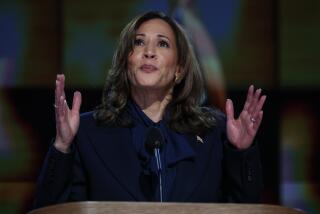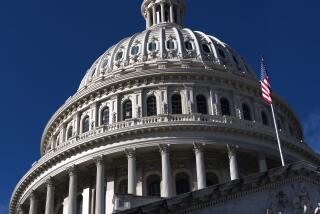Analysis finds Congress most polarized in decades
- Share via
Reporting from Washington — A new analysis of lawmakers’ voting patterns finds that the most recent Congress was one of the most polarized in decades.
National Journal’s yearly analysis of congressional votes found that for only the second time in nearly three decades there was with no party overlap in rankings of the most liberal or conservative members of the Senate. Only five House Republicans had more liberal voting records than Democrats.
“For most of American history, the two parties operated as ramshackle coalitions that harbored diverse and even antithetical views,” the magazine reported. “But since the early 1980s, they have vastly diminished as the differences within each party have narrowed and the distance between them has widened. … The results capture the continued remaking of Congress into an institution defined by much greater partisan discipline and philosophical conformity.”
In the House, seven Democrats tied for the distinction of most liberal members, including Tammy Baldwin of Wisconsin, Judy Chu and Linda Sanchez of California and Jan Schakowsky of Illinois. The five most conservative members were Republicans Trent Franks of Arizona, Jim Jordan of Ohio, Sam Johnson and Randy Neugebauer of Texas and Doug Lamborn of Colorado.
The Senate found even more ideological symmetry, with eight Republicans earning the distinction of most conservative -- including for the first time John McCain of Arizona -- and eight Democrats and one independent ranking as most liberal.
There was little reward for moderation among members of either chamber. The two most liberal House Republicans -- Joseph Cao of Louisiana and Charles Djou of Hawaii -- and the three most conservative Democrats --Travis Childers and Gene Taylor of Mississippi and Jim Marshall of Georgia -- all lost reelection bids last November.
In fact, more than half of the most conservative House Democrats were defeated, while the most liberal remained.
Centrist senators Arlen Specter (D-Pa.), Russ Feingold (D-Wis.) and Blanche Lincoln (D-Ark.) also lost, and others such as Byron Dorgan (D-N.D.), Evan Bayh (D-Ind.), George Voinovich (R-Ohio) and Judd Gregg (R-N.H.) chose not to seek reelection.
National Journal’s rankings are based on lawmakers’ votes on a slate of legislation – 664 in the House and 299 in the Senate.
twitter.com/mikememoli
More to Read
Get the L.A. Times Politics newsletter
Deeply reported insights into legislation, politics and policy from Sacramento, Washington and beyond. In your inbox twice per week.
You may occasionally receive promotional content from the Los Angeles Times.











